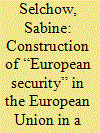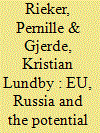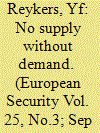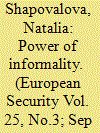| Srl | Item |
| 1 |
ID:
146994


|
|
|
|
|
| Summary/Abstract |
In June 2015 High Representative Mogherini presented her strategic assessment The European Union in a changing global environment as the express point of reference for the new EU Global Strategy. Grounded in the premise that this assessment is not simply a description of the state of the world but plays into the construction of social reality, this article sets out to understand the openings and closings of possibilities that it holds. My analysis generates a number of concrete insights, ranging from insights into the distinct nature of the challenges the EU is facing, to the discovery that there is no “existential threat” and the importance of “regions” as a guiding category. Grounded in an understanding of the world as being reflexive modern, I interpret these findings as displaying an intriguing and paradoxical interpretive disposition. On the one side, there is a notable opening towards unconventional conceptions of the world; on the other side, there is a symbolic conservation of existing EU institutions and programmes and a reproduction of modern premises. I argue that it is the first aspect that makes the document significant: Mogherini’s strategic assessment opens an important discursive space to think (European) security anew.
|
|
|
|
|
|
|
|
|
|
|
|
|
|
|
|
| 2 |
ID:
146999


|
|
|
|
|
| Summary/Abstract |
Many experts underscore a firm difference between (US) American and European approaches to combating terrorism. Other scholars contend that, since 11 September 2001, European governments have emulated the USA by “securitising” immigration and trampling on the civil and human rights of immigrants of Muslim heritage. Still other analysts discern within Europe distinct national styles of counterterrorism such as French assimilation and deportation versus British multiculturalism and conciliation. This article finds neither a coherent policy strategy nor an unmistakable political consensus in Europe regarding counterterrorism. Instead, a comparative analysis reveals a jumble of ethically inconsistent and practically contradictory measures.
|
|
|
|
|
|
|
|
|
|
|
|
|
|
|
|
| 3 |
ID:
146995


|
|
|
|
|
| Summary/Abstract |
Recent developments in European security have shown the growing need for a better understanding of the security dynamics on the European continent. This article presents an analysis of differing Russian and European perceptions of European security in general, and concerning the crisis in Ukraine in particular. As much of the literature on these issues has been normatively driven, we aim to provide an impartial presentation and analysis of the dominant Russian and EU discourses. This we see as essential for investigating the potential for constructive dialogue between Russia and the EU. If simplistic assumptions about the motivations and intentions of other actors take hold in the public debate and policy analyses, the main actors may be drawn into a logic that is ultimately dangerous or counterproductive. With this article we offer a modest contribution towards discouraging such a development in Russia–EU relations. After presenting an analysis of the differing EU and Russian perceptions, we discuss the potential for dialogue between such different worldviews, and reflect on potential implications for European security. As the article shows, there are tendencies of a certain adjustment in the Union’s approach that may make a partial rapprochement between the two sides more likely.
|
|
|
|
|
|
|
|
|
|
|
|
|
|
|
|
| 4 |
ID:
146998


|
|
|
|
|
| Summary/Abstract |
Although the sad track record of the EU Battlegroups has attracted considerable scholarly attention, analyses have largely focused on obstacles related to the provision of the Battlegroup troops and to the consensus within the EU Council, hence taking a supply-side perspective. This article calls for complementing this perspective with an analysis of the demand for their deployment. That implies analysing whether and why the EU Battlegroups were (not) considered as an option by those actors taking the initiative to intervene in a particular crisis. Applying a rational-institutionalist approach, this article explains the absence of the Battlegroups from three recent crises: Libya (2011), Mali (2013) and the Central African Republic (2013–2014). Using data from document analysis and elite interviews, it shows that once a rapid military reaction became urgent, the EU Battlegroups were not even considered as an option by those initiating an international reaction.
|
|
|
|
|
|
|
|
|
|
|
|
|
|
|
|
| 5 |
ID:
146997


|
|
|
|
|
| Summary/Abstract |
This article examines the little explored issue of non-state actor (NSA) participation in the European Union’s (EU) Common Security and Defence Policy (CSDP). Despite the fact that NGOs and civil society are shielded from formal access to CSDP, EU staff in both Brussels and the missions engage with them informally. Drawing on interviews with policy-makers and NSA representatives, the article analyses the practices of the EU in its engagement with NSAs, focusing on civilian missions in Georgia and Palestine. It shows that such engagement is more intense during implementation at the level of CSDP missions rather than during policy-making in Brussels. It argues that a combination of rational choice-based (functional needs of policy-makers and intensity of NSA advocacy) and constructivist (organisational and individual cultures) explanations helps us better understand why CSDP structures open up to NSAs. The article contributes to the nascent academic and policy debate on EU–civil society cooperation in CSDP and, more broadly, to the studies of informal governance in the EU and NSA participation in international organisations.
|
|
|
|
|
|
|
|
|
|
|
|
|
|
|
|